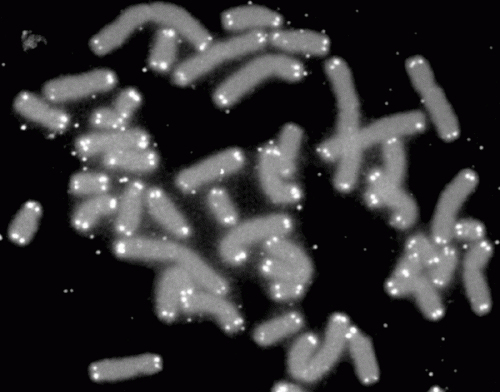March 11, 2014 report
For older men, short telomeres can be a sign of chronic stress

(Medical Xpress)—Andrew Steptoe of University College London and his colleagues have found that telomere length can predict how long it takes older men to recover from stressful situations. Men with shorter telomeres have longer recovery times than men with longer telomeres. This could mean that men with shorter telomeres suffer from chronic stress. The research appears in the Proceedings of the National Academy of Sciences.
Telomeres are protective strings of DNA that cap the ends of chromosomes. Over time, cell division and oxidative attacks cause telomeres to shorten. There is a connection between short telomeres and cellular aging; when telomeres reach a critical shortness, cell function is impaired and eventually, cells die. Scientists have found links between short telomeres and smoking, obesity, diabetes, high blood pressure, cancer, heart disease and susceptibility to infectious diseases.
Studies also show a correlation between psychological stress and short telomere length. Steptoe and his team wanted to understand why this correlation exists. They were particularly interested in an enzyme called telomerase (TA). This enzyme makes telomeres longer. It becomes more active in times of acute mental stress. Short telomeres and high TA activity could be a sign of a stressed system.
The researchers divided 333 healthy men and women between the ages of 54 and 76 into three groups, those with longer telomeres, those with shorter telomeres and low TA activity and those with shorter telomeres and high TA activity. All the subjects were given tasks designed to cause psychological stress.
When they performed the tasks, all the subjects experienced an increase in heart rate and blood pressure. Their levels of cortisol, a stress hormone, also rose. However, once the task was completed, some men found it easier to recover and return to normal conditions than other men. Men with longer telomeres had quicker recovery times than men with shorter telomeres. Men with shorter telomeres and low TA activity had quicker recovery times than men with shorter telomeres and high TA activity.
Psychological testing showed that men in the short telomere/high TA group were more hostile and less optimistic than other men. They also had less social support. The researchers think these men found it harder to recover from stress because they were carrying a high allostatic load. That is, chronic stress had caused the their regulatory processes to become disturbed.
These telomere-based differences occurred in the men studied, but not in the women. The researchers are not sure why this is so. They think estrogen could provide a protective effect on telomeres by inducing TA production, while testosterone could increase susceptibility to oxidative stress.
More information: Shorter telomeres with high telomerase activity are associated with raised allostatic load and impoverished psychosocial resources, Argita Zalli, PNAS, DOI: 10.1073/pnas.1322145111
Abstract
Recent work has linked psychological stress with premature cellular aging as indexed by reduced leukocyte telomere length. The combination of shorter telomeres with high telomerase activity (TA) may be indicative of active cell stress. We hypothesized that older individuals characterized by shorter telomeres with high TA in unstimulated leukocytes would show signs of high allostatic load and low levels of protective psychosocial resources. We studied 333 healthy men and women aged 54–76 y who underwent laboratory testing in which we measured cardiovascular, neuroendocrine, and inflammatory responses to standardized mental stress tasks. The tasks elicited prompt increases in blood pressure (BP), heart rate, cortisol, and mediators of inflammation and reductions in heart rate variability, returning toward baseline levels following stress. However, men having shorter telomeres with high TA showed blunted poststress recovery in systolic BP, heart rate variability, and monocyte chemoattractant protein-1, together with reduced responsivity in diastolic BP, heart rate, and cortisol, in comparison to men with longer telomeres or men with shorter telomeres and low TA. Shorter telomeres with high TA were also associated with reduced social support, lower optimism, higher hostility, and greater early life adversity. These effects were independent of age, socioeconomic status, and body mass index. We did not observe differences among older women. Our findings suggest that active cell stress is associated with impaired physiological stress responses and impoverished psychosocial resources, reflecting an integration of cellular, systemic, and psychological stress processes potentially relevant to health in older men.
© 2014 Medical Xpress

















